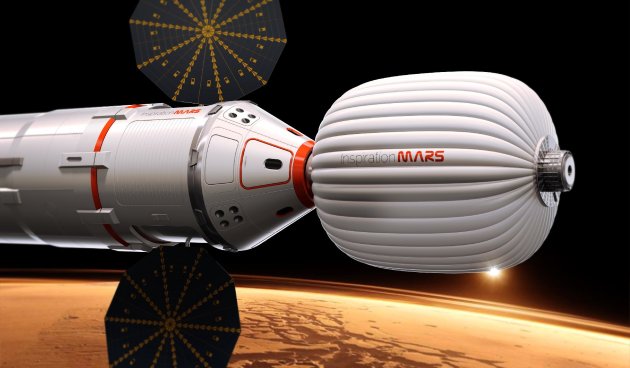
Under the audacious but bare-bones plan, the spacecraft would blast off less than five years from now and pass within 100 miles of the Martian surface. The cost was not disclosed, but outsiders put it at more than $1 billion.
The team of space veterans behind the project hasn't quite figured out the technical details of the rocket they will use or the capsule the husband-and-wife astronauts will live in during the 16-month voyage. But they know it will be an adventure not for the weak of body or heart.
"This is not going to be an easy mission," chief technical officer and potential crew member Taber MacCallum said. "We called it the Lewis and Clark trip to Mars."
The trying circumstances include:
no showers, limits on toilet paper and clothing, drinking water made
from the crew members' recycled urine and sweat, and almost no privacy.
But the flight also comes with never-before-seen views of Mars. And
there's ample time for zero-gravity sex in space, something NASA doesn't like to talk about.
As for why a man and a woman will be selected, "this is very symbolic and we really need it to represent humanity," MacCallum said.
He said if it is a man and a woman on such a long, close-quarters
voyage, it makes sense for them to be married so that they can give each
other the emotional support they will probably need when they look out
the window and see Earth get smaller and more distant: "If that's not
scary, I don't know what is."
The private, nonprofit project,
called Inspiration Mars, will get initial money from NASA
engineer-turned-multimillionaire investment consultant Dennis Tito, the first space tourist. The organizers hope to raise the rest through donations, advertising and media partnerships.
NASA will not be involved. Instead, the project's backers intend to
use a ship built by other aerospace companies, employing an austere
design that could take people to Mars for a fraction of what it would
cost NASA to do with robots, officials said.Even though some of the hardware hasn't even been built, Tito said he is confident everything will come together by 2018 with no test flights.
It will be a stripped-down
mission when it comes to automation and complexity, meaning the couple
will have to fix things on the fly like TV's MacGyver and do more
piloting than on NASA vehicles, said chief medical officer Jonathan Clark.
The flight is timed to take advantage of the once-in-a-generation
close approach of the two planets' orbits. The timeline calls for launch
on Jan. 5, 2018, the Mars flyby on Aug. 20, 2018, and a return to Earth
on May 21, 2019.It involves huge risk, more than a government agency like NASA would normally permit, officials concede. For example, the spaceship will fly during a period when galactic cosmic rays will be high because of the sunspot cycle. That will increase the crew's cancer risk by about 3 percent, which is more than on any NASA mission, Clark said.
The ship would also re-enter Earth's atmosphere at twice the speed of ordinary space capsules, something Tito said still needs to be worked out.
"Life is risky," said Clark, a former NASA flight surgeon whose astronaut wife died in the 2003 space shuttle Columbia accident. "Anything that's worth it is worth putting it all at stake for."
What may be most at stake is the crew members' marriage. The couple will be selected within a year.
MacCallum and his wife, Jane Poynter,
hope to be picked. They were a couple when they participated in
Biosphere 2, a sort of giant terrarium that was supposed to replicate a
mission on another planet. Poynter said it was such a fraught experience
psychologically that some participants wouldn't talk to each other for
most of the two years.
But MacCallum said it brought him and Poynter closer together. He
said the right couple going to Mars, if screened and counseled ahead of
time, would come back with a stronger marriage.Poynter said the husband and wife need to be even-tempered. Clark said they should be post-childbearing age because of exposure to radiation. Poynter is 50, MacCallum 48.
For the 30 years NASA has been flying men and women, it has avoided the question of sex in space. MacCallum said it will happen: "It's a man and wife. Private time. Let your imagination run wild."
In a statement, NASA spokesman David Steitz said the venture validates President Barack Obama's decision to rely more on private sector ingenuity to explore space, and is "a testament to the audacity of America's commercial aerospace industry and the adventurous spirit of America's citizen-explorers."
He said "NASA will continue discussions with Inspiration Mars to see how the agency might collaborate on mutually beneficial activities."
Stanford University professor Scott Hubbard, NASA's former Mars mission chief, said the team's technical paper outlining the flight is "long on inspiration, short on technical details. What is there is correct."
Other outside experts praised the expertise of the team but worried about the lack of testing.
Former astronaut and current MIT aerospace engineering professor Jeff Hoffman said: "Since they don't plan to land on Mars, it's really a question of keeping people alive for 501 days in space, which is not an impossible task."

No comments:
Post a Comment